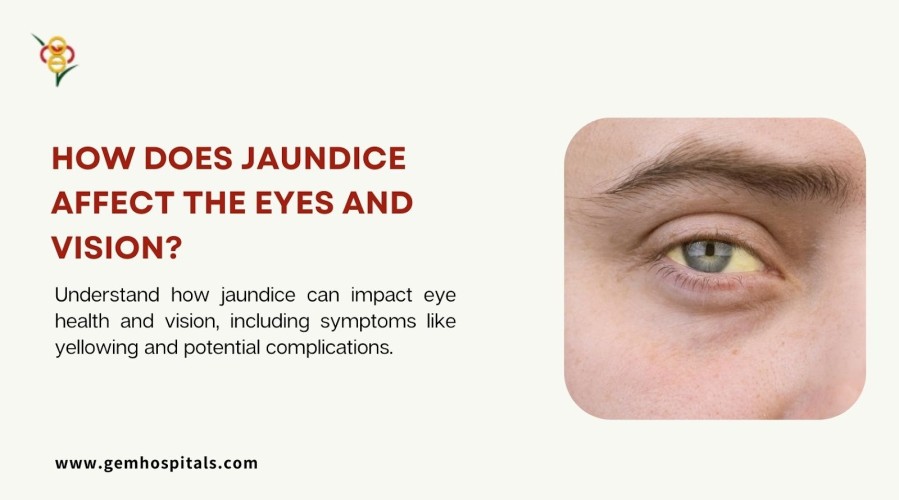Learn effective solutions for digestive problems with expert tips to improve gut health, reduce discomfort, and maintain a healthy digestive system.
How Does Jaundice Affect the Eyes and Vision

Jaundice, the prevalence in adults is considered to be rare but in case of the infants, they are reported as 80%. Even though jaundice is a common condition it has to be treated properly or else it will turn into a serious one. In jaundice the person's skin and eyes turn yellow color which is taken as a visible symptom of jaundice, this condition is especially due to the buildup of bilirubin levels in the blood. People know that jaundice has a greater impact on the liver but the thing is it also has an impact on other organs including the eyes, so they going to influence an individual’s vision. In such instances, only with the proper understanding of their effects, it is possible to recognize the signs of jaundice and able to get timely medical intervention.
Understanding jaundice
The jaundice occurs when there is an accumulation of bilirubin in the blood, it is a yellow pigment produced during the red blood cell breakdown. In general, the liver is the system that processes bilirubin and excretes it from the body. In that case, when the liver is not able to do so, because of conditions like hepatitis, cirrhosis, or bile duct obstruction there the bilirubin levels rise, which may lead to jaundice. Predominantly this condition is often a symptom of an underlying health issue, specifically relevant to the function of the liver, but it can also be seen in infants because of their immature liver function.
The link between jaundice and eye health
One of the common signs of jaundice is the yellowing of the white part of the eye which is called as sclera. This yellow discoloration is due to the deposition of bilirubin in the tissues of the eyes. But it just does not stay there it is one of the visible signs, but jaundice can have deeper effects on eye health and vision which can also bring permanent damage to an individual's vision.
The yellowing of the sclera is due to the deposition of the bilirubin in the conjunctive the clear membrane that covers the sclera. This condition now called scleral icterus, is usually one of the first signs of jaundice. Although the yellowing of the eyes is not going to affect the vision directly, it is an alarming sign of liver dysfunction that requires medical attention.
In rare cases, the jaundice may lead to a condition called keratopathy, where bilirubin gets deposited over the corneal layer of the eye. The cornea is the transparent, dome-shaped surface of the eye which is responsible for refracting the light inside the retina in that case it may bring up the corneal clouding, leading to blurry vision.
The jaundice may bring up photophobia, or light sensitivity, which is also considered as is it another symptom of jaundice. As the sensitivity increases it may cause discomfort, specifically in bright environments, and that influences the ability to perform tasks.
Managing jaundice and its effects on the eyes
To manage jaundice it is very important to address jaundice and its impact on the eyes which is caused by elevated bilirubin levels. Treatment strategies may include,
- In the case of managing jaundice medical intervention going to play a crucial role, jaundice is caused by an increased level of bilirubin that indicates the liver disease so proper medication, lifestyle changes, or in severe cases, liver transplantation becomes vital based on the severity of the city the treatment plans get varies. Once bilirubin levels are reduced, the yellowing of the eyes typically resolves.
- To manage light sensitivity and other eye-related symptoms it is vital to consult the doctor they can improve your comfort. Wearing sunglasses, avoiding bright lights, and using lubricating eye drops can help alleviate photophobia and discomfort associated with jaundice.
When to seek medical help?
Jaundice even though a common condition understand the importance of seeking medical attention while you are noticing the yellowing of the eyes or other symptoms of jaundice, such as yellowing of the skin, dark urine, or abdominal pain. Prefer the best hospital to get prompt treatment to overcome the condition and to lead a hindrance-free life.
For effective jaundice treatment, trust GEM Hospital’s experienced specialists. Receive personalized care and advanced solutions. Schedule your consultation now for comprehensive health management.
Blogs & Article
Explore current research trends in digestive health, including new treatments, advanced diagnostics, and innovations improving gut health and patient care.
Discover common digestive health myths and the real facts. Learn simple tips to improve gut health and maintain better digestion for a healthier life.


